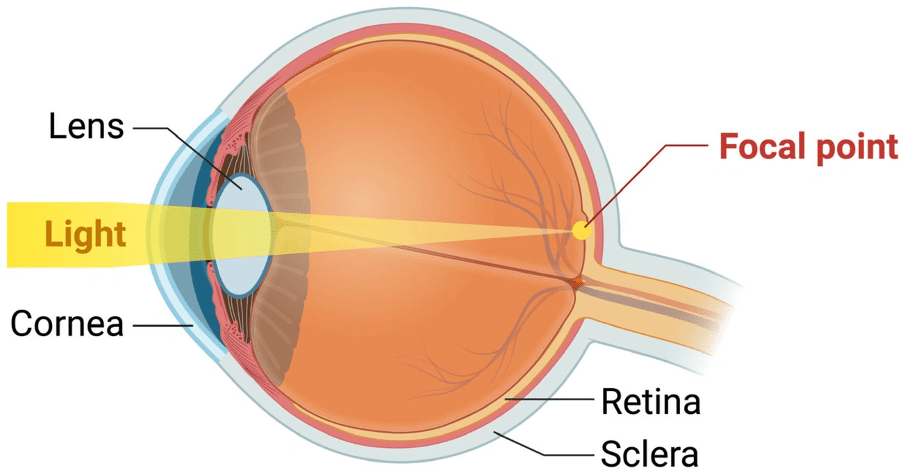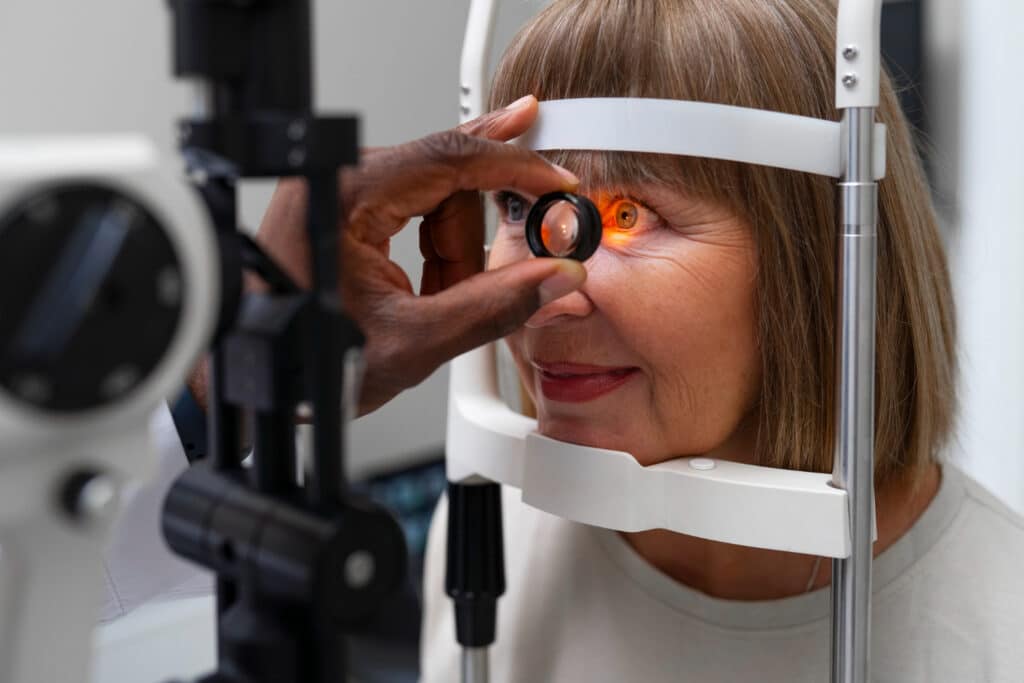The first sign of cataracts can be easy to miss. Small changes in your vision might not seem obvious at first, but they can signal the start of this common eye condition. Most people develop some form of cataracts by their 70s or 80s.
Your first symptoms might show up as slightly blurred vision. You could also become more sensitive to light or find it harder to see at night. These changes usually affect both eyes but can develop at different speeds. Early cataracts don’t deal very well with self-diagnosis. London eye specialists suggest regular dilated eye exams that can catch these changes early.
Catching these warning signs is a vital part of getting the right treatment at the right time. Your risk goes up if you have type 2 diabetes, high blood pressure, too much UV exposure, or if you smoke. But with the right medical support and awareness, doctors can manage cataracts successfully. This piece covers all the essential information you need about spotting and handling the first signs of cataracts.
How early cataract symptoms show up in daily life
Subtle changes in your daily routine might be the first sign of cataracts. Most people don’t notice these changes right away because cataracts develop slowly over months or years. Your first hint might be slightly blurred vision that feels like looking through a foggy window. This cloudiness makes everyday tasks harder to complete. Reading might need more light than before, and colours might look less vibrant and washed out.

Nighttime brings its own challenges. Driving becomes dangerous because headlights create uncomfortable glare or halos. This happens as cataracts scatter incoming light in your eye. Studies show people with cataracts struggle four times more in tough driving conditions.
Each type of cataract shows different warning signs. Nuclear cataracts, the most common age-related type, affect your central lens and make night vision difficult. Cortical cataracts cloud your lens edges and cause problems with bright light glare. Reading during daytime becomes harder with posterior subcapsular cataracts, which also create halos around lights. Simple tasks take more time as your vision gets worse. You might miss ingredients during cooking or vacuum up small items because they’re hard to see. Studies show that 83% of people have trouble with daily tasks as their eyesight deteriorates.
Blurry vision or glare at night? Don’t ignore the early signs. Find out when it’s time to consult Precision Vision London’s cataract experts.
More frequent changes in your eyeglass prescription could signal developing cataracts. Regular visits to your optician might point to this condition. Cataracts are very common in people over 66, affecting more than 240 million people worldwide. Vision problems from cataracts don’t just limit physical activities. They take an emotional toll too, with 26% of people feeling anxious about their reduced vision.
What’s happening inside the eye during early stage cataracts

Image Source: MDPI
Your eye’s lens sits behind the iris and pupil. This crystal-clear lens focuses light onto your retina. A healthy lens stays transparent throughout your life. Protein structure plays a key role in how cataracts form. Your lens has specific protein arrangements that keep it clear. These proteins start to change chemically as you age. Changes usually begin around age 40, but you might not notice any symptoms for many years.
Tiny protein clumps start forming in your lens. Light scatters when it hits these clusters instead of passing through clearly. This scattered light leads to the classic early cataract signs – your vision gets blurry and you see halos around lights. Your eye’s colour perception changes too. The lens takes on a yellowish-brown tint that philtres light before it reaches your retina. That’s why blues look faded and colours appear duller when cataracts start forming.
Cataracts can develop in different areas of your lens, and each type affects your vision uniquely:
- Nuclear cataracts show up in your lens’s centre and make it hard to see things far away
- Cortical cataracts look like wedge-shaped spokes from your lens’s edge and cause problems with glare
- Posterior subcapsular cataracts form at your lens’s back, making reading difficult and creating light halos
Everyone’s timeline differs. Most people’s cataracts grow slowly over the years. All the same, some things can speed up this process – smoking, UV exposure, diabetes, and certain medications like corticosteroids. Your eyes try to adapt during early stages. Your pupils might get bigger to let in more light, or your brain works harder to process what you see. That’s why mild cataracts often go unnoticed – your visual system adapts well to these gradual changes.
Proteins continue to cloud your lens, making it harder for light to reach your retina properly. Early stage cataracts mark the beginning of this clouding process, where protein clumping starts but hasn’t yet affected your vision by a lot.
What causes cataracts and who is at risk?
Your eyes’ natural ageing process causes cataracts. The proteins in your eye’s lens start breaking down and clumping together after age 40. These create cloudy areas that get worse as time passes. Most people develop some form of cataracts by their 70s or 80s. Scientists haven’t found one clear cause for cataracts, even after conducting the largest longitudinal study. Several factors can speed up how quickly they form.
Your lifestyle choices can affect cataract formation by a lot. Smoking puts oxidants in your body that harm lens cells. Too much alcohol speeds up protein breakdown in the lens. Your lens proteins can get damaged if you spend too much time in the sun without protecting your eyes. Many health conditions are linked to higher cataract risk. Diabetes leads the pack since high blood sugar changes lens proteins. Being overweight and having high blood pressure can also make cataracts form faster.
Eye injuries, inflammation, or past surgeries might change proteins and cause cataracts. Long-term use of certain medications can speed up cataract growth, especially corticosteroids that treat arthritis, allergies, or other inflammatory conditions. Genes play a big part too. Your family history might make your lens more likely to get damaged or cause proteins to break down earlier than normal.
Your personal background affects your risk level:
- Age is the biggest factor—risk jumps after 60
- Women get cataracts more often than men
- Living at high altitudes increases your risk
- People with severe dermatitis face higher risks
Knowing these risk factors helps you prevent cataracts better. You can’t change your age or genes, but you can make lifestyle changes. Wear good sunglasses, keep healthy blood sugar levels, quit smoking, and drink less alcohol. You should get complete eye checkups regularly if you have several risk factors. Finding cataracts early helps you manage this common condition better.
When to seek help and how Precision Vision London can support you

Your eye health depends on knowing the right time to get professional help for cataracts. These warning signs tell you it’s time to see an eye specialist:
- Your vision becomes increasingly cloudy or blurry
- You can’t focus properly
- Your eye turns red or painful
- Light or dark areas appear in your vision
- Bright lights make you uncomfortable or cause pain
- You see halos around lights, especially at night
Blurry vision or glare at night? Early signs shouldn’t be ignored. Let Precision Vision London’s cataract experts help you today.
Some symptoms need immediate medical attention. Floating dots, flashes of light, or a dark “curtain” moving across your vision could point to serious conditions that need urgent care.
Precision Vision London stands with you throughout your cataract experience. Our specialists take a full picture of your eye health during your first consultation and create a personalised treatment plan just for you. This approach will give a solution that fits your visual needs and lifestyle perfectly. The clinic’s excellence in patient care makes it stand out. World-renowned specialists with over 30 years of experience in the ophthalmic field lead their Harley Street clinic.
The clinic’s one-year Care Guarantee gives patients exceptional support and peace of mind after treatment. This complete aftercare programme helps achieve the best possible visual results. Life-changing results come standard at Precision Vision London. A 2013 study shows that cataract surgery patients experience a 36% better quality of life compared to those who skip the procedure.
Cataracts shouldn’t hold you back from living life fully. Surgery can remove cataracts easily and restore your eyesight completely when caught early. Precision Vision partners with you as your trusted guide to optimal eye health, providing expert care from early diagnosis through advanced surgical treatments.
Conclusion
Spotting cataract signs early can make a big difference in your treatment experience. Your vision might get blurry, night glares could increase, and colours may start to fade. These symptoms might seem small at first, but they point to important changes in your eye’s lens.
Your eyes need the same care and attention as the rest of your body. Early detection is the life-blood of good cataract management. Doctors can monitor and treat cataracts before they affect your quality of life too much if caught early.
Precision Vision London brings world-class expertise to guide you through your cataract care. Their specialist team has over thirty years of eye care excellence and creates treatment plans that match your specific vision needs. Their complete one-year Care Guarantee shows their commitment to your vision well after your procedure.
Millions of people have cataracts, but you don’t have to accept poor vision as you age. State-of-the-art surgical techniques at Precision Vision London have reshaped cataract treatment into a simple procedure with amazing results. Patients report life-changing improvements, and studies show a 36% better quality of life after proper treatment.
Your vision deserves exceptional care. Small changes in your vision or concerns about your eye health shouldn’t be ignored. A professional assessment at Precision Vision London can change everything. Their patient-focused approach and advanced technology will help bring life’s beautiful details back into focus.
FAQs
Q1. What are the initial symptoms of cataracts? Early signs include slightly blurred vision, increased sensitivity to light, and difficulty seeing at night. You might also notice colours appearing less vibrant or washed out.
Q2. At what age do cataracts typically develop? While cataracts can start developing as early as age 40, most people don’t experience noticeable symptoms until their 60s or later. By the time individuals reach their 70s or 80s, the majority will have some degree of cataracts.
Q3. How do cataracts affect night-time activities? Cataracts can make night-time activities, especially driving, more challenging. You may experience increased glare from headlights and see halos around lights, which can be particularly hazardous when driving after dark.
Q4. Can lifestyle choices influence cataract development? Yes, certain lifestyle factors can accelerate cataract formation. These include smoking, excessive alcohol consumption, prolonged exposure to sunlight without proper eye protection, and some health conditions like diabetes and high blood pressure.
Q5. When should I seek professional help for cataracts? It’s advisable to consult an eye specialist if you experience increasingly cloudy or blurry vision, difficulty focusing, discomfort from bright lights, or if you see halos around lights. Regular eye examinations are crucial for early detection and management of cataracts.
Authors & Reviewer
-
 Olivia: Author
Olivia: AuthorHi, I'm Olivia, a passionate writer specialising in eye care, vision health, and the latest advancements in optometry. I strive to craft informative and engaging articles that help readers make informed decisions about their eye health. With a keen eye for detail and a commitment to delivering accurate, research-backed content, I aim to educate and inspire through every piece I write.
-
 Dr. CT Pillai: Reviewer
Dr. CT Pillai: ReviewerDr. CT Pillai is a globally recognised ophthalmologist with over 30 years of experience, specialising in refractive surgery and general ophthalmology. Renowned for performing over 50,000 successful laser procedures.

